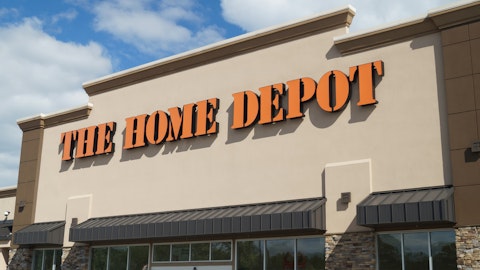In this article we discuss billionaire David Siegel‘s top 5 stock picks. If you want to read about the billionaire’s investment strategy and some of his favorite stocks, go directly to Billionaire David Siegel’s Top 10 Stocks Picks.
5. Target Corporation (NYSE: TGT)
Two Sigma slashed its stake in Target by 25% in the third quarter. The fund now owns 2.75 million Target shares, having a total value of $432.96 million. UBS in January said that Shipt is one of the biggest assets of Target and the company could utilize it smartly in the future. UBS compared Shipt to DoorDash and said that both serve as 3P logistics providers to consumer companies. Shipt grew 300% over the holidays, the report noted. Target in January said its comp sales in November and December jumped 17.2%, Comparable digital sales in the period rose 102%.
As of the end of the third quarter, 57 hedge funds tracked by Insider Monkey held long positions in Target.
Read: Is Target (TGT) A Good Stock To Buy Now?
4. Cisco Systems, Inc. (NASDAQ: CSCO)
David Siegel turned heavily bullish on Cisco in the third quarter, as his hedge fund increased its stake in the company by 117%. Two Sigma now owns over 11 million Cisco shares, having a total worth of $433.66 million. Overall, hedge fund sentiment remained flat for Cisco in the third quarter, as 59 funds moved into the fourth quarter with Cisco on their portfolios.
Cisco is currently in the news after it announced plans to buy Acacia (NASDAQ:ACIA) for $115 per share, The companies expect to complete the deal by the end of the first calendar quarter of 2021.
Heartland Opportunistic Value Fund said the following about Cisco in its Q3 Investor Letter:
“A handful of Information Technology (IT) names have been grabbing most of the investment headlines lately, however, as a whole, the sector has been a mixed bag from a performance standpoint. The Russel 3000® Value Index highlights the dynamic where the group ended the period mostly flat. Our holdings in the space outperformed marginally but also contained a key detractor, Cisco Systems, Inc. (CSCO).
Cisco, the world’s leading computer networking provider, was down for the period after revenues from its Products and Applications business lines weakened as IT departments postponed network spending in response to COVID-19. Sales from its security line were up roughly 14% but strength in the segment wasn’t large enough to offset weakness elsewhere. Impressively, they held operating margin on a 9% revenue decline.
Wall Street’s reaction to the weak results were mixed. Some credited the company for executing well in the face of an unprecedented macro pressure on its clients, while others cited results as an indicator that Cisco is struggling in its transformation from a predominantly hardware-oriented business to one that generates recurring-revenue through software and services.
The challenges faced by Cisco strike us as a temporary setback to what has been ongoing progress in its transition to a model that generates recurring revenue and is less tied to the IT spending cycle.
We believe the positive strides made in previous quarters will resume. With the recent setback, shares are trading at an attractive 12x earnings, while generating a nearly 4% dividend yield and a free cash flow/enterprise yield of nearly 10%.”
3. Lowe`s Companies Inc (NYSE: LOW)
Two Sigma sold 12% of its existing stake in retailer Lowe’s in the third quarter. The fund now owns 2.65 million shares of the company, worth over $440 million. On Feb. 1, KeyBanc Capital Markets downgraded Lowe’s stock to Sector Weight from Overweight. The firm said in its note that while it remains positive on Lowe’s CEO Marvin Ellison’s transformation of the company operations, it sees risk ahead, especially in the DIY segment. The firm is also concerned about the stock valuation.
A total of 83 hedge funds out of the 816 tracked by Insider Monkey reported having stakes in Lowe’s at the end of the third quarter.
Pershing Square Capital Management said the following about Lowe’s in their Q2 2020 Investor Letter:
“Earlier this year, Lowe’s began to experience a significant acceleration in demand, as U.S. consumers in lock down began to invest more in their homes, which has contributed to Lowe’s year-to-date stock price increase of 40%. In recent months, Lowe’s sales have reflected unprecedented demand across the home improvement sector. Lowe’s has also benefitted from actions taken over the prior year to improve the company’s competitive position, driving additional share gains.
Lowe’s second quarter results reflected extraordinary 35% U.S. comparable sales growth, substantial operating margin expansion, and robust earnings growth. While comparable sales growth has moderated somewhat in recent months, demand patterns continue to be well above historical averages. Although it is difficult to know how much longer the elevated demand environment will persist, we believe the pandemic has provided Lowe’s with a unique opportunity to showcase its improved merchandising, greater in-stock levels, and excellent customer service to a growing base of customers. This should drive greater customer frequency and loyalty, leading to correspondingly higher same-store-sales and profit margins over the long term.
In 2020, beyond adapting the business for surging demand and the associated operational strains imposed by Covid-19, Lowe’s continues to invest behind critical strategic initiatives, including improving omnichannel capabilities. Management completed the re-platforming of its ecommerce platform earlier this year, and will now focus on enhancing online features and functionality, thereby improving the overall user experience. Lowe’s is also accelerating investments in its supply chain initiatives, a critical element of the company’s longer-term business transformation. We believe that Lowe’s continues to make substantial progress toward achieving each of management’s high-priority initiatives, which will aid Lowe’s future competitive position.
In recent quarters, Lowe’s management has begun to acknowledge its medium-term 12% operating margin target as “not the end point,” but rather “a stop along [Lowe’s] journey,” and has further noted that they believe Lowe’s “can do better than that over time.” As Lowe’s revenue productivity and margins begin to approach its best-in-class peer Home Depot, which achieved a greater than 14% profit margin last year, it will generate significant increases in profit, which, when coupled with the company’s likely soon-to-be-relaunched, large share repurchase program should lead to accelerated future earnings-per share growth.
Despite Lowe’s significant stock price appreciation, it currently trades at approximately 19 times our estimate of Lowe’s next-twelve-month earnings (vs. Home Depot at 25 times), a valuation which does not reflect its potential for significant future profit improvement. As a result, we believe that Lowe’s share price has the potential to appreciate substantially as the company continues to make progress on its business transformation.”
2. Home Depot Inc (NYSE: HD)
In the third quarter, Two Sigma cut its position in Home Depot by 8%, ending the period with 1.74 million shares of the company, worth $482.2 million. Home Depot is seeing a surge in demand as people confined to their homes in the coronavirus are spending more money and time fixing and upgrading their houses. In the third quarter, the company said its comp sales jumped 24.1%.
As of the end of the third quarter, 73 hedge funds tracked by Insider Monkey held positions in Home Depot, down from 85 funds a quarter earlier.
Ensemble Capital Management said the following about HD stock in their Q4 Investor Letter:
“A notable detractor from our performance came from our investment in Home Depot. Home Depot reported outstanding results during 2020, with the stock outperforming the S&P 500 for the full year. But after strong second and third quarter performance, the stock was down slightly in the fourth quarter, declining approximately 4%. We believe that home improvement spending will remain elevated in the years ahead as housing activity continues to rebound after years of lower than normal rates of Americans moving.”
1. Microsoft Corporation (NASDAQ: MSFT)
David Siegel’s hedge fund ended the third quarter with 3.4 million shares of the Redmond software giant. The total value of this stake is $715.53 million. The position accounts for 2% of Two Sigma’s portfolio. Two Sigma is one of the 234 hedge funds tracked by Insider Monkey that are bullish on MSFT, as of the end of the third quarter. The collective value of these stakes is $42.1 billion.
In its fiscal second-quarter earnings, Microsoft issued guidance for fiscal third quarter which was above expectations. Revenue for the Productivity and Business Processes segment is expected to total $13.35 billion -13.6 billion, above the consensus estimate of $12.9 billion.
Please also see 10 Best Penny Stocks to Buy Now and 10 Biggest Companies With Female CEOs.





